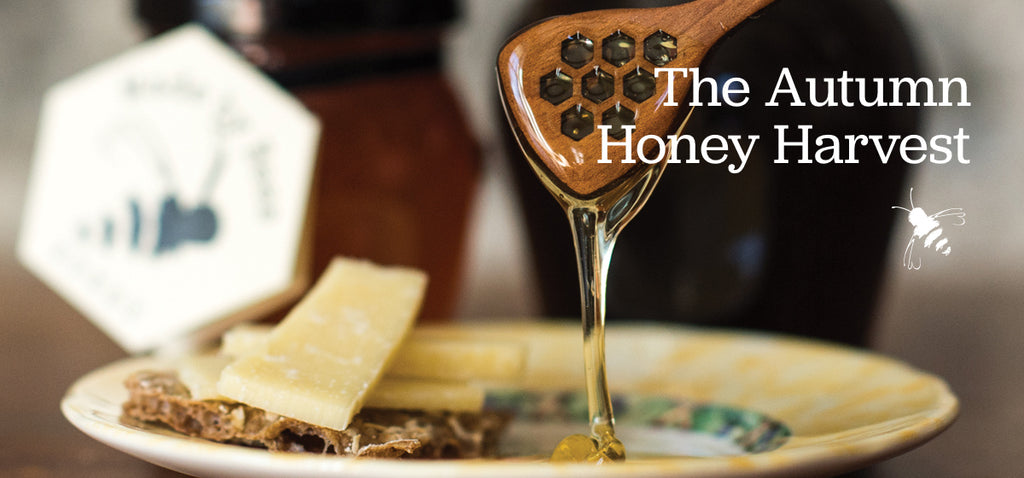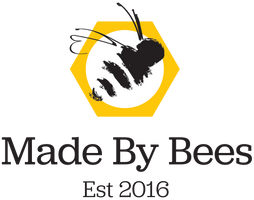
Autumn Beekeeping
As the cool nights creep in and the leaves begin to change, the beehive undergoes significant seasonal changes.
• Food sources (nectar and pollen) become limited• The Queen bee's egg-laying decreases
• Drone (male) bees leave the hive, and the hive population declines
To best support the colony during this transition time, beekeepers have a few essential autumn tasks:
• Reducing entrances to the hive
• Giving the bees a supplementary feed of sugar syrup
• Providing the Queen with a few empty frames to lay in
• Checking for honey stores and harvesting honey
Feeding the Bees
The bees are given an extra feed of a sugar and water mixture to ensure they have enough food stores for the winter.
• The sugar feeding box has a slit in the middle that allows the bees to come up through from their brood box to access the trays of sugar water.
Isolating the Bees for Honey Harvesting: Quebec Bee Escape Boards
Using bee escape boards ensures that frames intended for harvest are free of bees. This is one of the most gentle, and most bee-friendly ways to harvest honey.
Escape boards are a wooden, triangular board that looks almost like a miniature maze. Bees can go through the boards in only a single direction. These boards are placed between the brood box and the honeycomb frame we wish to harvest. This leaves the frame empty of bees so it can be harvested!

The Honey Harvest
To harvest honey in the autumn is a 3-step process. First, we need to ensure that the frame is filled with enough honey to remove the frame from the hive without harming the bees. After that, the honey frame must be "uncapped," which is the process of removing the waxy layer that seals the honeycomb. Finally, the last step is to crush or extract the honey from the frame and strain it.
Buck Autumn also marks the harvest of one of our favourite honey varieties, buckwheat!
What is buckwheat honey?
Buckwheat honey is made from the nectar of small, buckwheat flowers. Honeybees must work hard to gather this honey and its yields are often much smaller than more wildly available wildflower honey. Because buckwheat is produced in small quantities, you won't see this variety in most grocery stores. Fortunately, local beekeepers often make this delicious, malty variety—including Made By Bees. Check out all of our honey varieties!
• Dark amber in colour, less sweet than wildflower honey and malty in flavour
• Rich in antioxidants
• Small yield honey crop
Buckwheat honey is generally an autumn harvest, and the areas that produce buckwheat honey tend to have short growing seasons and long winters, like Ontario! Buckwheat honey is easily identifiable by its signature dark appearance in contrast to traditional clover honey. Buckwheat varies in colour, ranging from rich amber colour with a reddish tint, purple, to almost black.
Cooking with Honey in Autumn
Filled with antioxidants, buckwheat honey is characteristically less sweet than regular wildflower honey and features a malty, full-bodied, rich flavour.
This thick honey is a wonderful substitute for maple syrup on breakfast foods and can easily be used in marinades, sauces or as a molasses substitute. Use buckwheat in your favourite holiday turkey marinade, add it to glazed oven-roasted carrots, or use it as a sugar substitute in pumpkin pie recipes.
Warm from the oven, Autumn foods like meats and root vegetables go hand in hand with the delicate sweetness of buckwheat and other honey varieties.

Try some of our favourite honey-infused recipes:
Buckwheat Honey Cake Recipe
Buckwheat Hot-Toddy Recipe
Honey-Glazed Turkey Recipe
Honey-Glazed Carrots Recipe

Leave a comment